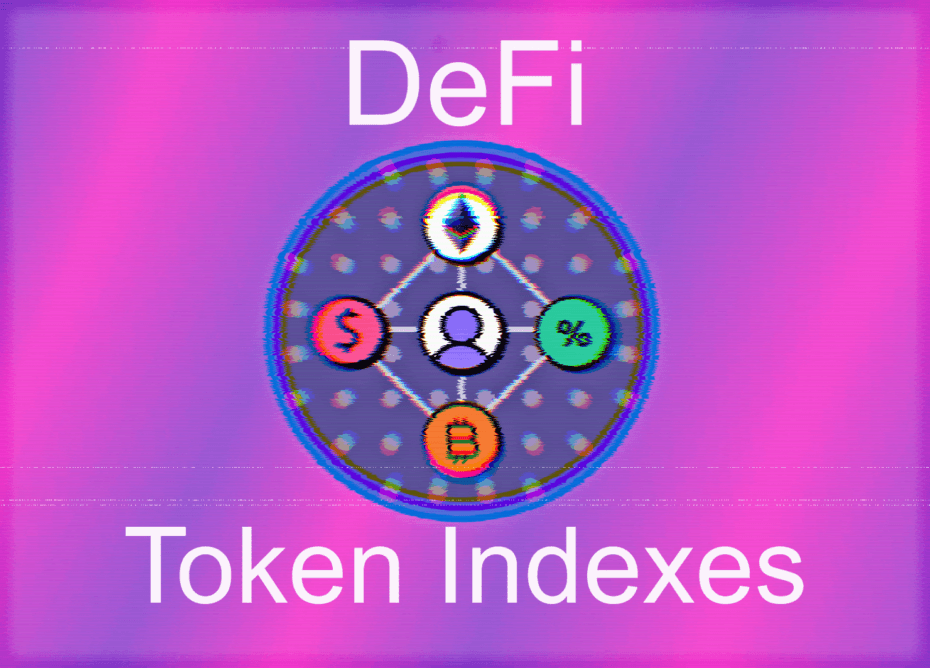
DeFi Token Indexes are one of the simplest, safest ways to invest in DeFi.
What if you wanted to invest in DeFi, but at the same time, you are not fan of the idea of having to constantly monitor and manage a portfolio with different tokens and assets?
Fortunately, DeFi Indexes have you covered. These assets, inspired by traditional stock market indexes, are managed ‘baskets’ of tokens that automatically rebalance using smart contracts.
Importantly, these are also on-chain, which means they actually form part of DeFi itself. You can even use DeFi index tokens as collateral in other DeFi Protocols!
The largest DeFi indexes
Another benefit to DeFi Indexes is that, if you have a smaller portfolio, the savings on network fees (‘gas’) for buying one token may be beneficial, compared to buying them individually.
Let us briefly cover some of the largest DeFi indexes (by Market Capitalization) available today:
DeFi Pulse Index (DPI)
- Market Cap: $119m+
- Number of tokens: 12
- Fees: Annualized 0.95%
Created by Index Coop in collaboration with DeFi Pulse, and built on Set Protocol, the DeFi Pulse Index is the largest DeFi index token by a wide margin.
With DPI, the underlying tokens are reviewed and index weights adjusted each month. Additionally, holders can always redeem 1 DPI for its underlying assets. Management of DPI is performed by holders of the INDEX governance token.
More advanced users can also earn INDEX tokens by supplying liquidity to the ETH/DPI Uniswap pool, and then staking these liquidity tokens in the Index Coop Farm.
You can learn more about what makes up DeFi Pulse Index, as well as the methodology behind how the index is managed, on the Index Coop DPI page.
Indexed Finance (DEFI5, CC10, DEGEN, ORCL5, NFTP, FFF)
- Total value locked: $47m+
- Number of indexes: 6
- Fees: 0.3% (Swap fee)
Indexed Finance is a project focused on the development of passive portfolio management strategies.
Each index pool (there are currently 4) has an ERC20 index token representing ownership in a diverse portfolio that tracks the market sector the index represents. Anyone can mint these tokens by providing the underlying assets in the pool, burn to claim the underlying assets, or swap with exchanges to easily manage their exposure to specific markets.
Indexed Finance is managed by the holders of its governance token NDX, which is used to vote on proposals for protocol updates and high level index management such as the definition of market sectors and the creation of new management strategies. The balancing and re-weighting of indices happens automatically on-chain.
You can learn more about Indexed finance here, or read a full comparison with PieDAO and DPI by Cryptotesters here.
Synthetix DeFi Index (sDEFI)
- Market Cap: $11m+
- Number of tokens: 14
- Fees: None
The Synthetix DeFi index tracks the price of top DeFi protocols using Coingecko’s price-feeds. With the largest number of assets represented, sDEFI is a useful metric for tracking DeFi as a whole.
However, it’s important to note that sDEFI is a synthetic tracker, which means that you can’t redeem it for underlying tokens, like with DPI.
You can learn more about the composition of sDEFI on Synthetix here.
PieDAO DeFI Large-Cap (DEFI+L)
- Market Cap: $5.4m+
- Number of tokens: 8
- Fees: 0.7% streaming fee to reward DOUGH holders
The first of PieDAO‘s decentralized token portfolios, DEFI+L, focuses on DeFi protocol tokens with large market capitalizations. Some of the protocols included are Decentralized Exchanges (such as Uniswap and SushiSwap) and lending protocols like MakerDAO and Compound.
PieDAO is a DAO, or Decentralized Autonomous Organization. This means anyone can participate in the DAO by holding their DOUGH token (which can be earned from interactions with the PieDAO protocol).
Both DEFI+L and DEFI+S are part of PieDAO’s ‘Pie’ offering, which are managed by DOUGH holders. PieDAO also offers PieVaults, which are also fully collateralized, and generate extra yield for index owners.
PieDAO DeFi Small-cap (DEFI+S)
- Market Cap: $2.8m+
- Number of tokens: 6
- Fees: 0.7% streaming fee to reward DOUGH holders
Aimed at offering exposure to smaller market cap projects, DEFI+S is focused on ‘underdog’ projects with large growth potential. This includes decentralized contracts, and cross-chain DeFi-composability. Due to the nature of these tokens, DEFI+S could be considered even riskier than its Large-cap sibling.
You can learn more about PieDAO’s decentralized asset offerings on their website here.
Downsides & risks of DeFi indexes
The first major downside of DeFi indexes is that you are losing some control over the tokens in your portfolio. If you determine that a token is overvalued, or disagree with its inclusion in the index, you may not have any recourse to modify it. On the other hand, you could end up gaining exposure to a token that explodes in value you might not have expected.
Another downside to be aware of with DeFi indexes is smart contract and oracle risk. Oracle risk could arise when the ‘oracle’ that the token uses to get its prices from somehow experiences a failure, either through hacking or some other incident. This could cause the value of the index to drop as it attempts to rebalance to account for faulty information.
Share this Post